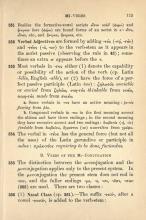352. Verbal Adjectives are formed by adding -τός (-τή, -τόν) and -τέος (-ᾱ, -ον) to the verb stem as it appears in the aorist passive (observing the rule in § 43); sometimes an extra -σ- appears before the -τ-.
353. Most verbals in -τος either:
1. denote the capability or possibility of the action of the verb (cp. Latin -bilis, English -able), or
2. have the force of a perfect passive participle (Latin -tus).
ζηλόω : ζηλωτός (enviable or envied)
νοέω : νοη-τός (thinkable)
ποιέω : ποιη-τός (made)
a. Some verbals in -τος have an active meaning.
ῥέω : ῥυ-τός (flowing)
b. Compound verbals in -τος in the first meaning accent the ultima and have three endings; in the second meaning they have recessive accent and two endings.
διαβαίνω : διαβατός, -ή, -όν (fordable)
γράφω : ἄγραπτος, -ον (unwritten)
354. The verbal in -τέος has the general force (but not all the uses) of the Latin gerundive or participle in -ndus.
πρᾱκ-τέος requiring to be done [Latin faciendus]

